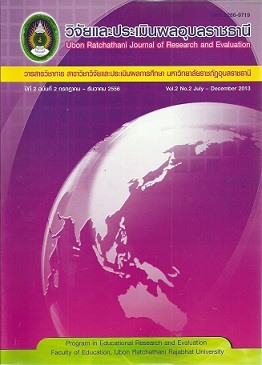A Development of Academic Achievement of Sufficiency Economy, and Psychological Sufficiency of Matthayom Suksa 1 Students Ban Thung Yai School through Cooperative learning
Keywords:
หลักปรัชญาเศรษฐกิจพอเพียง, ผลสัมฤทธิ์ทางการเรียน, จิตลักษณะตามหลักปรัชญาเศรษฐกิจพอเพียง, วิจัยปฏิบัติการ, การเรียนแบบร่วมมือAbstract
The purposes of this research were : 1) to develop the academic achievement of sufficiency economy and psychological sufficiency of Matthayom Suksa 1 students by using cooperative learning, 2) to compare the academic achievement of sufficiency economy and psychological sufficiency of Matthayom Suksa 1 students before and after teaching by cooperative learning. The sample were 25 Matthayom Suksa 1 students of Ban Thung Yai school under the Ubon Ratchathani’s Primary Educational Service Area 1 in the first semester of the academic year 2012. They were selected by a purposive sampling method. The research instruments were : (1) 10 lesson plans on cooperative learning; (2) tests of sufficiency economy, whose difficulty indices ranged from .37 to .85, discrimination indices ranged from .26 to .83 and reliability value was .94; (3) psychological sufficiency scale, whose discrimination indices ranged from .31 to .82 and alpha coefficient reliability was .93, and (4) qualitative instruments consisted of students and teachers’ behavior records, interview form, and observation form. The data were statistically analyzed by percentage, mean, standard deviation and Wilcoxon test.
The research findings were as follows:
- the development of academic achievement using cooperative learning consisted of the four ladder system circles. Each circle had four steps : 1) plan 2) action 3) observation and 4) reflection. It showed that the students’ achievement was improved in each circle.
Students have psychological development. They can work neatly, have good manners, and keep classrooms orderly and clean. Students have special activities that they come up with that show their psychological development, which includes Circle 1: morality enrichment activities, Circle 2: creative activities, Circle 3: life and happiness giving activities, and Circle 4: Saving activities. Students can see the importance of friendship, charity, kindness, knowing how to say thank you and sorry, how to forgive, and know their role. Parents are satisfied with the change in their children who show the better development of Academic Achievement of Sufficiency Economy and Psychological Sufficiency.
- the students’ academic achievement of sufficiency economy was higher than before at the statistical significance of .01.
3. the students’ psychological sufficiency was higher at the statistical significant of .01.
References
จิราภรณ์ บุญเจือ. การพัฒนาชุดการสอน เรื่อง การดำเนินชีวิตตามแนวทางเศรษฐกิจพอเพียง สำหรับนักเรียนชั้นมัธยมศึกษาปีที่ 3. วิทยานิพนธ์ครุศาสตรมหาบัณฑิต มหาวิทยาลัยราชภัฏอุบลราชธานี, 2551.
ดวงเดือน พันธุมนาวิน. การวิจัยเพื่อพัฒนาเครื่องมือวัดจิตลักษณะแบบพหุระดับ ตามหลักปรัชญาเศรษฐกิจพอเพียง. กรุงเทพฯ : สำนักงานคณะกรรมการวิจัยแห่งชาติ, 2551.
ธีรวุฒิ เอกะกุล. เอกสารการสอนวิชาการวิจัยเชิงปฏิบัติการ. อุบลราชธานี: คณะครุศาสตร์ มหาวิทยาลัยราชภัฏอุบลราชธานี, 2552.
ปรียานุช พิบูลสราวุธ. “ออกแบบการเรียนรู้อย่างไรให้เด็กเกิดอุปนิสัยพอเพียง,” วารสารวงการครูและผู้ปกครอง 79 (กันยายน 2553) : 19.
พิฑูรย์ บุ้งทอง. การปฏิบัติการพัฒนาผลสัมฤทธิ์ทางการเรียนและจิตลักษณะตามหลักปรัชญาเศรษฐกิจพอเพียง โดยใช้การเรียนแบบร่วมมือสาระเศรษฐศาสตร์ ชั้นมัธยมศึกษาปีที่ 1 โรงเรียนบ้านทุ่งใหญ่. วิทยานิพนธ์ครุศาสตรมหาบัณฑิต มหาวิทยาลัยราชภัฏอุบลราชธานี, 2556.
มงคล วิลามาศ. การพัฒนาความสามารถทางการเรียนการแก้โจทย์ปัญหาวิชาฟิสิกส์โดยเน้น วิธีการเรียนรู้แบบร่วมมือกันเรียนรู้ ระดับชั้นมัธยมศึกษาปีที่ 4. วิทยานิพนธ์ครุศาสตรมหาบัณฑิต มหาวิทยาลัยราชภัฏอุบลราชธานี, 2551.
วิชาการ, กรม. หลักสูตรการศึกษาขั้นพื้นฐาน พุทธศักราช 2544. กรุงเทพฯ: กรมวิชาการ กระทรวงศึกษาธิการ, 2544.
ศึกษาธิการ, กระทรวง. คู่มือดำเนินการพัฒนาหลักสูตรพัฒนาผู้นำการเปลี่ยนแปลงเพื่อรองรับการกระจายอำนาจ สำหรับครูและศึกษานิเทศก์. กรุงเทพฯ: กระทรวงศึกษาธิการ, 2551.
สวัสดิ์ สิมเสมอ. การเปรียบเทียบผลสัมฤทธิ์ทางการเรียนกลุ่มสร้างเสริมประสบการณ์ชีวิต หน่วยที่ 7 เรื่อง จักรวาล และอวกาศ ชั้นประถมศึกษาปีที่ 5 ด้วยการสอนแบบร่วมมือกับการสอนตามคู่มือครู. วิทยานิพนธ์ครุศาสตรมหาบัณฑิต มหาวิทยาลัยราชภัฏอุบลราชธานี, 2548.
สุวิมล คับพวง. การปฏิบัติการเพื่อพัฒนาทักษะการแก้โจทย์ปัญหา กลุ่มสาระการเรียนรู้คณิตศาสตร์ ชั้นประถมศึกษาปีที่ 4 โรงเรียนบ้านป่าเลา สำนักงานเขตพื้นที่การศึกษาอุบลราชธานี เขต 3. วิทยานิพนธ์ครุศาสตรมหาบัณฑิต มหาวิทยาลัยราชภัฏอุบลราชธานี, 2548.
Johnson, M. J. and K. Button. “Action Research Paves the Way for Instruction Improvement,” Journal of Staff Development. 19 (Winter 1998) : 45-51.
Downloads
Published
How to Cite
Issue
Section
License
1. บทความที่ตีพิมพ์ในวารสารนี้ได้มีการตรวจสอบการลอกเลียนงานวรรณกรรมแล้ว ไม่เกินร้อยละ 25
2. บทความที่ตีพิมพ์ในวารสารนี้เป็นข้อคิดเห็น ข้อค้นพบของผู้เขียนบทความ โดยผู้เขียนบทความต้องเป็นผู้รับผิดชอบต่อผลทางกฎหมายใด ๆ ที่อาจเกิดขึ้นจากบทความนั้น ๆ
3. บทความ ข้อมูล เนื้อหา รูปภาพ ฯลฯ ที่ได้รับการตีพิมพ์ในวารสารวิจัยและประเมินผลอุบลราชธานี ถือเป็นลิขสิทธิ์ของวารสารวิจัยและประเมินผลอุบลราชธานี หากบุคคลหรือหน่วยงานใดต้องการนำทั้งหมดไปเผยแพร่ต่อหรือเพื่อกระทำการใดๆ จะต้องได้รับอนุญาตเป็นลายลักษณ์อักษรจากวารสารวิจัยและประเมินผลอุบลราชธานีก่อนเท่านั้น และจะต้องมีการอ้างอิงวารสารวิจัยและประเมินผลอุบลราชธานี ฉบับนั้น ๆ ด้วย






